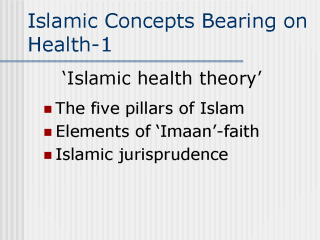| front |1 |2 |3 |4 |5 |6 |7 |8 |9 |10 |11 |12 |13 |14 |15 |16 |17 |18 |19 |20 |21 |22 |23 |24 |25 |26 |review |
 |
As mention in
the previous slide these three concepts can be said to be the basis for an “Islamic
Health Theory” (See figure 1 previous slide). The guiding principles for these concepts
are found in both the Quran and ahadith. In his last sermon the prophet Mohammed is
reported to have said “…Verily I have left amongst you that which will never lead
you astray, the BOOK OF ALLAH, which if you hold fast you shall never go astray.
And beware of transgressing the limits set in the matters of religion, for it is
transgression of religion, that brought destruction to (many people) before you…”. In
another version he is reported to have said “…I leave behind me two things, the
QURAN and my example, the SUNNAH and if you follow these you will never go astray…”
(Jan, 1996; Submission, 2001). Both versions and most of other versions show
clearly the importance of the Quran, the emphasis on following it and its importance as a
source of direction for Muslims and therefore the basis for which, behavioral intention or
behavior towards health is derived. The link towards health can be found on two main
levels, directly and indirectly. In looking at the links, these are seen mostly in the
Islamic prescriptive nature towards mans behavior (Quran 2:63, 67-71, 143, 187, 208, 229,
285; 5:6 etc) and towards environmental factors. For instance in looking at the direct
prescriptive nature the Quran (5:6) states “O ye who believe! When ye prepare for
prayer, wash your faces, and your hands (and arms) to the elbows; rub your heads (with
water); and (wash) your feet to the ankles. If ye are in a state of ceremonial impurity,
bathe your whole body…” and towards the environment “He has made the sea
subject to you (45:12) He has made the rivers subject to you (14:32), He has
made what the earth contains subject to you. (15:65) He has made the sun and the
moon subject to you. (16:12) And “He has made all that the skies and earth
contain subject to you. (45:13) and for both cases the Quran states “He has
enforced the balance. That you exceed not the bounds; but observe the balance strictly;
and fall not short thereof (55:7–9)”. Indirectly the link towards health is found
in the principles that underlie both contemporary health promotion notions and Islamic
concepts, which can be the basis for sound communication between Muslims and health
promoters. However, the linkage is not confined from one (indirect) or the other (direct)
but rather the influence to the determinants of health behavior can be said to be in a
continuum from indirect link to direct link. References: Jan, H. P. (1996). The Prophet Muhammad’s last sermon Sabini, J. (1992). Social Psychology. 500 fifth avenue, New York, N.Y 10110. W.W. Norton & Company, Inc. Submission. (16th June 2002). Prophet Muhammad’s Last Sermon http://www.submission.org/sermon.html |
| front |1 |2 |3 |4 |5 |6 |7 |8 |9 |10 |11 |12 |13 |14 |15 |16 |17 |18 |19 |20 |21 |22 |23 |24 |25 |26 |review |